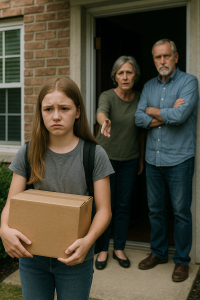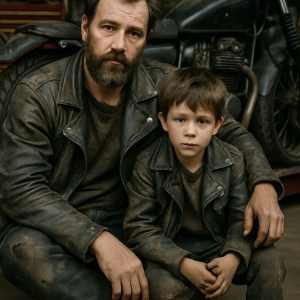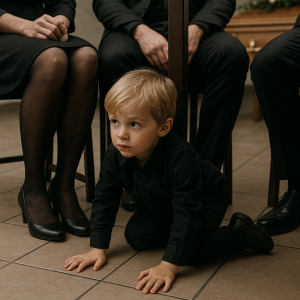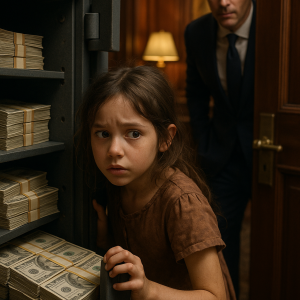My name is Rachel Morgan, and I never expected to stand on my parents’ doorstep again. The last meaningful conversation I’d had with them was at my grandmother’s funeral three years earlier. Before that, our relationship had shattered on the day I turned eighteen — the day they chose my sister, Caroline, over me.
I can still remember their words like shards of glass. They told me they were giving my college fund — the money I had relied on to chase my dreams — to Caroline so she could have a lavish wedding.
“But that’s my education!” I cried, my voice raw with disbelief.
“Your sister deserves a proper wedding,” my mother insisted firmly. “You can always take out student loans.”
That day, I walked out of their house and never truly came back. My grandmother, the only person who believed in me, helped me pay for community college. I worked tirelessly, earned my degree, and built a life for myself. I got married, welcomed my daughter Lily, and later divorced. By the age of 36, I was proud of what I had built. I had inherited my grandmother’s apartment, which provided steady rental income, and I worked part-time, giving me plenty of precious time with Lily.
But then, years later, one phone call pulled me back into the storm.
An Urgent Call from the Past
“Rachel, please come. It’s urgent.” My mother’s voice cracked through the phone, and against my better judgment, I drove back to the home I had once sworn never to return to.
When she opened the door, I barely recognized her. She looked older, worn down, with an exhaustion that clung to her every movement. My father lingered behind her, offering me a smile that didn’t quite meet his eyes.
Inside, the living room still held the expensive furniture they had once bought for Caroline’s wedding. Now, it looked faded and tired — a symbol of everything they had sacrificed for her.
Tears streamed down my mother’s face as she finally admitted the truth.
“We’re going to lose the house,” my father confessed.
And of course, it was all connected to Caroline.
“She begged us to take out a business loan for her husband, Mark,” Mom explained, trembling. “We used the house as collateral.”
“Let me guess,” I said bitterly. “They stopped paying.”
Dad nodded, unable to meet my eyes. “The business went bankrupt. We can’t keep up with the payments.”
I laughed — not with humor, but with years of pent-up anger. “So after everything you did to me, you expect me to fix Caroline’s mess? Again?”
Mom quickly added, “We know you’re doing well, Rachel. We wouldn’t ask if we weren’t desperate.”
I wanted to walk out right then. But then I thought of Lily — my daughter, who had only seen her grandparents in photographs. Against my better instincts, I stayed.
Choosing to Help — With Conditions
A week later, I returned with Lily. Her face lit up at the sight of her grandparents, and despite my hesitation, I couldn’t deny her that connection.
“Fine,” I told my parents. “I’ll help with the loan. Lily and I will move in here. The rent from my apartment will go toward the payments. I’ll also help with bills — but this comes with boundaries.”
They eagerly agreed, and soon Lily and I moved in. I replaced old appliances, bought a new refrigerator, and even paid for a dishwasher that eased my father’s back problems. For a while, it almost felt like a real family. My mom helped with school pickups. My dad played chess with Lily every week. Slowly, our lives found a rhythm.
But the cracks were still there.

The Return of Old Habits
My mother never stopped taking secret phone calls from Caroline. I noticed money transfers leaving her account and going straight to my sister.
“Mom,” I confronted her one evening, “I’m paying your bills and covering Caroline’s defaulted loan. How can you justify sending her more money?”
“She’s going through a hard time,” Mom snapped defensively.
“And what about me?” I pressed. “What about Lily?”
But the conversation ended there. She never listened, just like before.
Three years passed like this. Then came the day everything shattered again.
The Day My Sister Came Back
One Tuesday afternoon, I returned early from a business trip, eager to surprise Lily. But instead, I walked into chaos.
Caroline was sprawled across the couch, her two kids running wild around the living room. Suitcases littered the floor.
“Oh, look who’s here,” she said flatly.
“I left Mark,” she announced. “He’s useless. The kids and I are staying here now.”
“In the house I pay for?” I asked incredulously.
Caroline rolled her eyes. “Some of us have real problems, Rachel. Not everyone can be Miss Perfect.”
“Girls, please,” Mom interjected. “We need to stick together as family.”
But “family” suddenly meant Caroline again. Just like always.
Lily Becomes Invisible
As Caroline settled in, Lily began to fade into the background. The same way I once had.
When she proudly showed my mother her A+ on a math test, Grandma brushed her aside to focus on Caroline’s son. When she asked Grandpa for their chess match, he said he was tired — right before playing catch with Caroline’s daughter.
My daughter was becoming invisible. And I couldn’t let history repeat itself.
The Night Everything Changed
When work called me to Seattle for five days, I hesitated but trusted my parents to care for Lily. Four days in, my phone rang.
“Mom?” Lily’s small, broken voice trembled through the line. “Aunt Caroline kicked me out. She said I was in the way. I’m outside. I don’t know what to do.”
My heart stopped. My child. Alone. At night.
I quickly called my friend Megan, who lived nearby, begging her to pick up Lily. Then I called my parents.
“Did you watch while Caroline threw your granddaughter out?” I demanded.
Silence. Then my mother’s chilling words: “Maybe it’s for the best. You and Lily don’t really belong here anymore.”
It was the final knife to the heart.
“You’re right,” I whispered. “We never did.”
Cutting Ties Once and for All
The next morning, I returned with movers.
“Take everything I purchased,” I instructed them. “The appliances, the furniture, all of it.”
“You can’t do this!” Mom cried.
“I can,” I said calmly, showing receipts. “These are mine.”
When my father tried to protest, I cut him off. “You chose Caroline over me again. And now you’ve chosen her over Lily. We’re done.”
I left, taking Lily with me. That day, I also cut off every financial tie.
Rebuilding a Real Family
Life after leaving was liberating. I used the money I once spent on my parents to travel with Lily, to invest in her education, to give her the life she deserved.
She joined the chess club at school, her grades soared, and for the first time, she was free from the shadow of favoritism.
When she turned eighteen, she was accepted into her dream university. We celebrated with a trip to Italy. She was thriving, and so was I.
The Final Goodbye
Six years later, I received a call. My father had died suddenly of a heart attack. My mother begged me to come. Caroline pleaded too, desperate for help.
I paid for the funeral — one last act of responsibility, not affection. At the service, my mother whispered, “Now maybe things can go back to the way they were. We need you, Rachel.”
I looked her in the eye. “Nothing will ever go back. A real family doesn’t throw a twelve-year-old onto the street at night. You stopped being my family a long time ago.”
I laid a single white rose on my father’s casket and walked away.
“My Sister Threw My Young Daughter Out of My Parents’ Home” — those words define the end of a toxic cycle that had plagued my life for decades. My parents lost everything, not because of me, but because of their own choices and blind devotion to Caroline.
Lily and I built a better life, free from their manipulation. The money I once gave them now funds Lily’s future — a future they tried to steal from me years ago.
And this time, I made sure no one could take it away from her.









